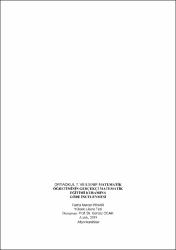Ortaokul 7. ve 8.sınıf matematik öğretiminin gerçekçi matematik eğitimi kuramına göre incelenmesi
Özet
Bu çalışmanın amacı, ortaokul 7. ve 8.sınıf matematik öğretiminde ortaokul matematik öğretmenlerinin Gerçekçi Matematik Eğitimi Kuramına uygun öğretim yapıp yapmadıklarının belirlenmesidir. Bu amaç doğrultusunda, nitel araştırma yöntemlerinden biri olan çoklu durum çalışması kullanılmıştır. Araştırma sürecinde, Bilecik İli Osmaneli İlçesindeki demografik özellikleri farklı dört okuldan 7 farklı matematik öğretmeni belirlenmiştir. Her bir öğretmenin yürüttüğü 7. ve 8.sınıf Matematik dersleri gözlemlenmiş, gözlemlere yönelik rubrik değerlendirmeleri ve 8 hafta sonunda da yedi öğretmenle görüşme yapılmıştır.
Araştırmanın verileri araştırmacı tarafından hazırlanan gözlem formu, rubrik ve görüşme aracılığıyla elde edilmiştir. Çalışmanın bulguları incelendiğinde, 7. ve 8.sınıf Matematik öğretimi sürecinde dört öğretmenin Gerçekçi Matematik Eğitimi Kuramı’na göre; üç öğretmenin ise geleneksel öğretim ile ders işlediği belirlenmiştir.
Araştırmada elde edilen bulgular doğrultusunda, 7. ve 8.sınıf matematik öğretiminde Gerçekçi Matematik Eğitimi Kuramı sınırlılıkları; geleneksel öğretim, soru-cevap yönteminin kullanılması, öğretmenden kaynaklı öğretmen-öğrenci etkileşiminin az olması, Matematik dersinin günlük hayatla ilişkilendirilmemesi, ders saatlerinin azlığı, veli ve okul yönetimi baskısı, müfredatın yoğun olması tespit edilmiştir. The purpose of this study is to determine whether of the middle school math teachers in the 7th and 8th grade mathematics education are teaching according to Realistic Mathematics Education Theory. To reach the aim, multiple case study, which one of the qualitative research methods, was used. In the research process, seven mathematics teachers from four different middle schools whose demographic cheracteristics were determined in Osmaneli district of Bilecik province were determined. The 7th and 8th grade mathematics course by each teacher were observed, rubric assensments were made for observations and seven teachers were interviewed after eight weeks.
In the study, the qualitative data were obtained from the observation form, the rubric and the personal interview. When the findings of the study were examined, it was determined that while four teachers used the Realistic Mathematics Education Theory, the other three ones used the traditional teaching methods during the 7th and 8th grade maths lessons.
In the light of the findings obtained from there search; the reasons of the limitations of the Realistic Mathematics Education Theory in teaching Maths to 7th, and 8th graders are determined as followed; traditional teaching, using question-answer methods, insufficient interaction between teacher and learner that stems from the teacher, being unable to associate mathematics with daily life, insufficient teaching hours, pressure of parents and school administration on teachers, having too much to teach according in the curriculum.
Bağlantı
https://hdl.handle.net/11630/9880Koleksiyonlar
- Yüksek Lisans Tezleri [1638]



















